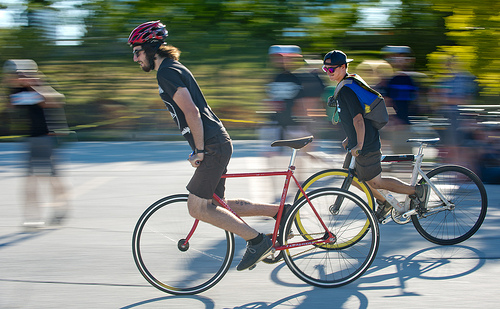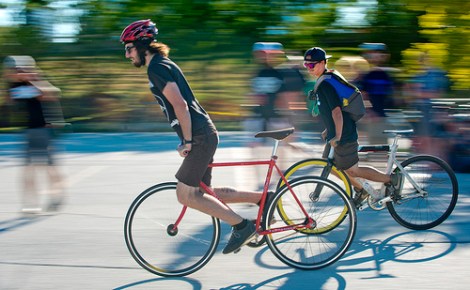
Photo by Dave Schlabowske.
Last week, while the world’s finest amateur athletes competed in London, hundreds of poorly paid professional athletes from four continents convened in Chicago for the Olympics of bike messengering. They were here for the 20th annual Cycle Messenger World Championships, the ultimate test of two-wheeled delivery prowess.
It was a long, alcohol-fueled week of events celebrating the courier lifestyle, including the main race simulating a day of work in the Chicago Loop business district, on-street “alleycat” races, a courier-themed film night, track competitions, and the Messenger Prom, where cyclists got dolled up in slinky dresses and ironic tuxedos.
Many pundits have predicted that bike couriers would go the way of the Pony Express, rendered obsolete by digital technology. But the crowd of messengers, who came from as far away as Guatemala, Japan, and Australia, proved that, while email and online file sharing have cut into the messenger business since the salad days of the 1990s, as cities grow more congested, there may always be a place for fast, efficient, environmentally friendly bike delivery.
On Sunday, the last day of the “champs,” dozens of couriers gathered in a huge parking lot next to the Soldier Field football stadium to compete in the finals for the main race, with parcels to transport, multiple checkpoints to visit, and plenty of split-second logistical decisions to make. Many rode sleek fixed-gear bikes, and most wore some combination of high-tech bike gear and thrift store threads.
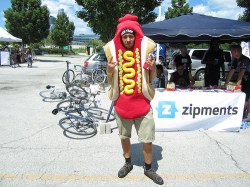
Photo by John Greenfield.
If there was a uniform, it consisted of a cycling cap, cut-off Dickies work pants, and a single-strap bag customized with colorful patches. There was plenty of brightly dyed hair, along with dreadlocks, piercings, and tattoos. One guy with a Fabio-like mane had an angel inked on each bicep, one labeled “Triumph” and the other “Failure.”
I buttonholed a fellow dressed as a giant hotdog, one of the unofficial symbols of this meat-obsessed city. “My favorite thing about the championships is seeing all of my friends from other places, getting drunk, and racing,” he said, introducing himself as S.K., from Minneapolis. “If you’re a bike messenger, sometimes it seems like everyone else in the world is a jerk and other messengers are the only people you want to hang out with.”
S.K. offered to sell me a copy of “The Full Package,” a pin-up calendar featuring male Minneapolis couriers in their skivvies, a fundraiser for the 2014 North American Cycle Courier Champions, to be held in the Twin Cities.
As I walked away from the human frankfurter another courier teased, “Your wiener’s showing.”
At one of the race checkpoints, longtime Chicago messenger John “Blunt” Robbins, sporting turquoise dreads, posed for photos shirtless with his trademark banana-seat bike held over his head. “The people here are all my family,” he said. “We’re all related and we’ve all got the same mother, no matter what race, creed, or color, because as messengers we’ve had the same experiences and the same difficulties.”
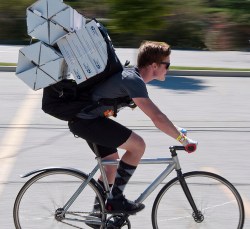
Photo by Dave Schlabowske.
These hardships include pedaling hard in heavy traffic in pouring rain, freezing cold, and this summer’s record-setting heat. Broken bones and totaled bikes are common, and many couriers have war stories of near-death experiences. But while the job used to offer relatively good earning potential for “unskilled” labor, with efficient couriers making over $25,000 a year in commissions during the late ’90s, nowadays most messengers make little more than minimum wage, sans benefits.
Yuki Ogawa, from Tokyo, which hosted the world championships in 2009, said the challenges of messengering in her city include hard-to-find addresses, speeding motorcycles, slow-moving housewives on “mamachari” utility bikes, and taxicabs with automatic doors that can suddenly open in a cyclist’s path.
After the finals of the main race, there was a cargo competition, with contestants transporting boxes, bricks, car tires, and wooden pallets via trailers and specialized cargo bikes, or simply stuffing items into their courier bags and carrying them by hand.
The guy in the sausage suit excelled in the sprint competition, and the heat after his featured a racer who streaked in the nude, save for his bike helmet. (Although many couriers opt not to wear head protection at work, helmets were mandatory for the racers.)
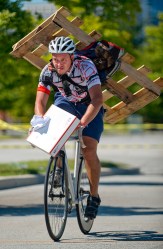
Photo by Dave Schlabowske.
The final competition was skids, with contestants on brakeless fixed-gears locking their knees to halt their tires, performing amazing slides on the pavement while leaning over the handlebars at a 45-degree angle to the ground. The longest skid won.
After the races were over, the couriers pedaled to a nearby rock club for live-band karaoke and an awards ceremony. When the final results were tabulated, the overall male and female winners were announced: Craig Etheridge from Seattle and Josephine Reitzel from Lausanne, Switzerland. The scruffy, sweaty, PBR-swilling crowd went wild.
The enthusiasm of the couriers for their job was palpable, but with all the difficulties, dangers, and low pay, why do they still love it? “If you’ve got some alternative ideas about using oil and using cars in the city, being a courier is a great way to do what you’re talking about,” explained Jérôme Demuth from Paris. “You’re outside, you’re getting exercise, it’s a rush — and it’s good fucking work.”

